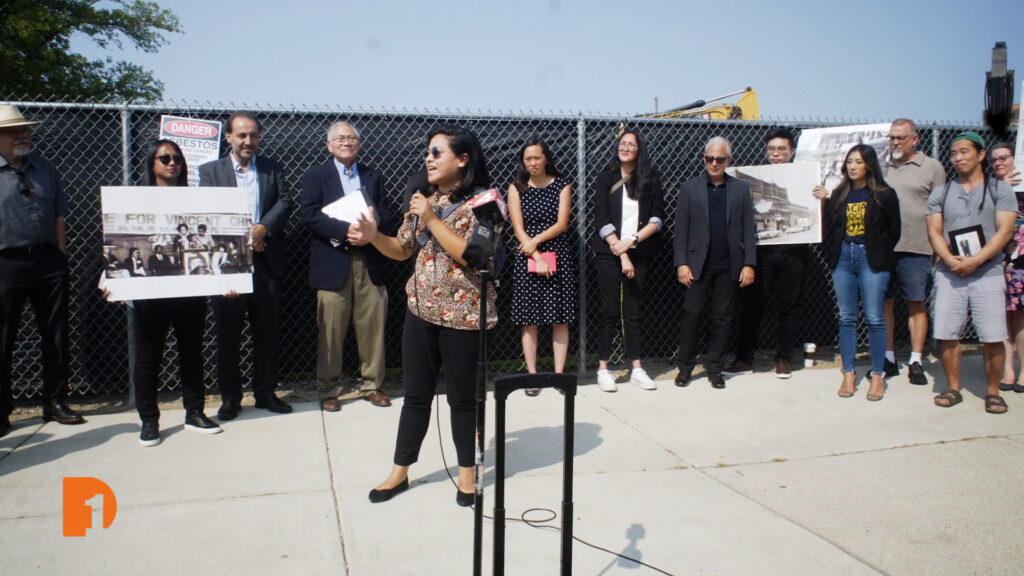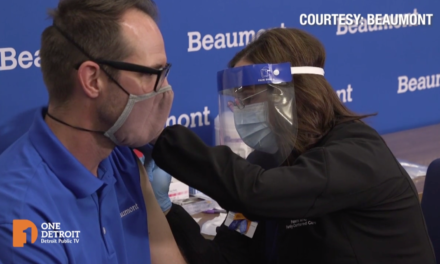A historic building in Detroit’s Chinatown has been torn down, even as advocates were attempting to save it. Despite backlash from the Asian American community, 3143 Cass Avenue was demolished July 29. The historic building was at the heart of Detroit’s Chinatown and held historical and spiritual significance to the neighborhood.
City officials said the building was a public safety hazard, and the building’s current owners, Olympia Development of Michigan, the Ilitch family organization’s real estate firm, obtained a permit to tear it down despite a unanimous vote by the Detroit City Council to halt the demolition. The building had stood there for 140 years.

Residents, activists and Detroit City Council members stand in front of 3143 Cass Avenue, the site of a historic building in Detroit’s Chinatown, advocating for the building to not be demolished. | Photo by One Detroit
The building was known as the Chinese Merchant Association building, according to American Citizens for Justice President Roland Hwang. When the building was in use, the ACJ organized there following the killing of Vincent Chin in 1982. Its demolition marks the continuation of an all-but-lost Chinatown in Detroit nowadays. Detroit’s first Chinatown was moved in the 1960s due to the construction of the Lodge Freeway, and many Asian Americans opted to move to the suburbs of Detroit in the 1970s.
Producer Bill Kubota visits a press conference at the demolished site where activists and residents talk about what this loss means to the Asian American community in Detroit, as well as ways to preserve the history of Chinatown and what some want to see happen in the future.
Full Transcript:
Bill Kubota, Senior Producer, One Detroit: Detroit City Council had requested the decrepit building be temporarily spared from demolition. 3143 Cass Avenue, considered the heart of what was once Chinatown. Asian-American groups called a press conference last week for this Monday to try to save it. Too late. It had been smashed down over the weekend.
Gabriela Santiago-Romero, Detroit City Council Member, District 6: I’m an immigrant. I deeply understand the importance of knowing our history so that we don’t repeat the wrongs of our past. And quite frankly, I did not expect the administration in Olympia to play hardball with history. I expected us to slow down a little.
Hayg Oshagan, Immigration Task Force, Detroit City Council: Arrogance is not a good trait in politics. Neither is greed. Neither is cynicism. And all three were at play here, unfortunately, at the expense of part of the history of this city.
Bill Kubota: History? Things that happened not that long ago.
Nicole MacDonald, Filmmaker, “Last Days of Chinatown”: This is the lower corridor, part of the larger Cass Corridor.
Bill Kubota: Filmmaker Nicole McDonald told some of the story in her 2018 documentary “Last Days of Chinatown,” an examination of Human Displacement.
Nicole MacDonald: They run along Cass Street, in the center of the lower corridor.
Bill Kubota: Olympia Development of Michigan and Ilitch Company owns this property. The city has wished it torn down for years.
Arthur Park, Central United Methodist Church, Detroit: Many might say, why make a fuss over an old crumbling building? The fuss is not so much over a building but over the spiritual loss of a once alive and vibrant community. Our feeling of loss is not unlike that which the African-American brothers and sisters felt when Black Bottom and Paradise Valley, Detroit’s cultural and musical hub were urbanized.
Bill Kubota: I-375, took out those black neighborhoods in the early 1960s, around the time Detroit’s first Chinatown was displaced by the city too, making way for the Lodge Freeway.
Nicole MacDonald: Chinatown had markets and schools set up, a clinic, there were 53 restaurants, and over 3,000 Chinese people living there.
Bill Kubota: So then the business district moved to Cass Avenue, south of Mack.
Nicole MacDonald: They set up markets and restaurants again and had festivals in the new spot. But the new Chinatown never became what the original place had been. And a lot of Chinese felt their neighborhood had been destroyed in the move.
Don Yee, former Chinatown resident: I think, basically, during the eighties, it was shutting down. Chinatown was dissolving.
Bill Kubota: Here’s Chinatown then, as seen in the 1987 film “Who Killed Vincent Chin?”
Carolyn Chin Watson, Granddaughter of restaurant owners: My grandfather came here in the thirties. And think about just the race relations at the time. So getting a job was difficult so they did what they knew, which was cook. They cooked.
Bill Kubota: Carolyn Chin Watson’s family owned The Shanghai Cafe in the 3143 building.
Carolyn Chin Watson: Actually, it was James’s family that sold the restaurant to my family. Long story short is that they were able to live and grow a family, and that’s just one of the many family stories that come from Detroit’s Chinatown.
James Lee, Grandson of Restaurant Owners: There’s no disputing the progress that’s been made in this area, but there’s a cost to that progress. You compare Detroit to other cities like Chicago. They have a respect for their history. It’s obvious when you walk through the city. And I think one of the underlying problems in the Metro Detroit area is the fact that we don’t have a connection to the past, we don’t have an agreement, or understanding with each other about our past, our shared past, and consequently our ripe to misinformation and misunderstanding.
Bill Kubota: Roland Hwang leads A.C.J. The American Citizens for Justice.
Roland Hwang, President, American Citizens for Justice: And it was actually at 3143, the Chinese Merchant Association building at the time, that had its inaugural meeting where A.C.J. got its name. There are so many memories that are just rekindled by what’s happened over the last few days.
Bill Kubota: A.C.J. emerged after Vincent Chin was killed in 1982 as anger was directed at the Japanese, whose imports hurt domestic car sales. Asian Americans joined together and found a voice in the protests.
Jasmine Rivera, Co-Executive Director, Rising Voices: This is a ground that is historic because it actually was key to a movement that centered around Vincent Chin, but then spread nationwide.
Stephanie Chang, Michigan State Senator, 3rd District: Seeing the demolition on Saturday was devastating for many of us. But I really believe that the city and Olympia have an opportunity, if they choose to take it, to work hand in hand with the Asian-American community, with the descendants of Detroit’s Chinatown, to actually celebrate history and to recognize the importance of the community.
Bill Kubota: What’s left? The long-closed Chung’s restaurant, a couple more buildings, and a few reminders of the Chinatown that was.
Gabriela Santiago-Romero: I’m dedicated and committed to ensuring that we do designate Chinatown as historic. It is not yet, and we need to. It is a must. We have to do that moving forward.
Stay Connected:
Subscribe to One Detroit’s YouTube Channel & Don’t miss One Detroit Mondays and Thursdays at 7:30 p.m. on Detroit Public TV, WTVS-Channel 56.
Catch the daily conversations on our website, Facebook, Twitter @DPTVOneDetroit, and Instagram @One.Detroit
View Past Episodes >
Watch One Detroit every Monday and Thursday at 7:30 p.m. ET on Detroit Public TV on Detroit Public TV, WTVS-Channel 56.




